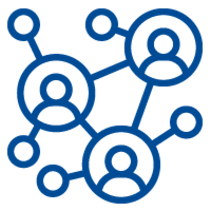Welcome to the Institute of Genetic Epidemiology!

October 1, 2025:
Institute Merger to form the
Institute of Epidemiology and Prevention
The new institute combines the former Institute of Genetic Epidemiology and the Institute of Prevention and Tumor Epidemiology under the leadership of Prof. Anna Köttgen.
Our new homepage is under construction!
We are using data from epidemiological and clinical studies to gain insights into human physiology and the pathophysiology of complex traits and diseases, with a special focus on kidney and metabolic diseases. For this purpose, we combine genetic and epigenetic data with clinical information and biomarkers such as metabolites by applying and developing methods.
We often work in collaborative international research settings and seek for partners who use complementary methods to study similar diseases. Conversely, we are happy to support our research and clinical partners with our experience. In this way, we ultimately hope that our research will help to recognize, prevent and treat complex diseases.
The Institute of Epidemiology and Prevention is part of the Department of Data Driven Medicine.
News:
- December 2025: CHARGE Outstanding Poster Award for Zulema Rodríguez HernándezZulema Rodríguez Hernández received the CHARGE Outstanding Poster Award at the 2025 CHARGE Consortium Meeting in Durham, North Carolina. Her poster presented our framework for Phenome-wide Molecular Causal inference Network Analyses (PMCN). https://www.chargeconsortium.com/main/golden-tigers
-
September 2025: Inga Steinbrenner Receives Second Stephan-Weiland Prize from the DGEpiAt the 20th Annual Scientific Meeting of the German Society for Epidemiology (DGEpi) in Münster (September 23–25, 2025), Inga Steinbrenner was awarded the second Stephan-Weiland Prize for early-career epidemiologists.
She received the award for her publication “Associations of Urine and Plasma Metabolites With Kidney Failure and Death in a Chronic Kidney Disease Cohort”, published in the American Journal of Kidney Diseases (AJKD) (Last author: Peggy Sekula). The Stephan-Weiland Prize recognizes innovative and relevant contributions to epidemiological research in Germany. - July 2025: Pascal Schlosser joins the Freiburg Center for Data Analysis, Modeling and AI (FDMAI)Pascal Schlosser was elected as a new Member of the Freiburg Center for Data Analysis, Modeling and AI (FDMAI). https://uni-freiburg.de/fdmai/
- March 2025: Group publication highlighted in World Kidney Day collection of AJKDThe theme of World Kidney Day (WKD) 2025 is "Are Your Kidneys OK? - Detect early, protect kidney health". In recognition of WKD on March 13, 2025, the editors of the American Journal of Kidney Diseases (AJKD) present a collection of ten articles that highlight kidney disease research from around the world. As part of this collection, our article "Associations of Urine and Plasma Metabolites With Kidney Failure and Death in a Chronic Kidney Disease Cohort" (first author: Inga Steinbrenner, last author: Peggy Sekula) will be publicly available until March 31, 2025 and you can find our article and the overall collection under https://www.ajkd.org/content/worldkidneyday.
- January 2025: Oleg Borisov Receives Grant from the Medical Scientist ProgramOleg Borisov has secured two-year funding as a Digital Medical Scientist through the renowned Hans A. Krebs Medical Scientist Program. This Program supports outstanding postdoctoral researchers pursuing translational research projects at the University Medical Center Freiburg. https://www.med.uni-freiburg.de/de/forschung/karrierewege/medical-scientist/
-
November 2024: Helmut-Holzer-Award for Pascal SchlosserOn November 4, Pascal Schlosser was awarded the prestigious Helmut Holzer Research Award for his innovative research in statistical genomics and molecular epidemiology by the Wissenschaftliche Gesellschaft Freiburg. The Helmut Holzer Research Award honors researchers for their remarkable achievements in the fields of medicine, natural and technical sciences.
https://www.wissges.uni-freiburg.de/forschungsfoerderung/foerderpreise-und-preistraeger/ - October 2024: Successful participation in ASN Kidney WeekThe Institute of Genetic Epidemiology team participated in the 2024 Kidney Week meeting with an invited talk (Anna Köttgen), an oral and five poster presentations. Our contributions were recognised with a Kidney Stars travel grant (Inga Steinbrenner) including tailored events and networking opportunities, and one poster was highlighted in a Top Trainee poster session (Stefan Haug).
-
October 2024: CHARGE Cupples Mentorship Award for Anna KöttgenThe Institute of Genetic Epidemiology team showed up for the 2024 CHARGE Consortium Rotterdam meeting, including an invited talk (Anna Köttgen), a plenary session talk (Nora Scherer), 5x working group talks, and 4x posters. Our contributions were recognized by 2x travel awards (Nora Scherer, Sara Monteiro-Martins) and the CHARGE Outstanding Poster Award 2024 (Oleg Borisov), and the CHARGE Cupples Mentorship Award 2024 for our terrific mentor, Anna Köttgen!
https://www.chargeconsortium.com/main/golden-tigers - October 2024: Future Prize Nephrology for Ulla SchultheißOn October 28, Ulla T. Schultheiß was awarded the Future Prize Nephrology by the Board of Trustees of the German Society of Nephrology for her work entitled “Interactive Exploration of Adverse Events and Multimorbidity in CKD”. The Future Prize Nephrology is awarded for innovative research work focussed e.g. on digital medicine. The interactive plots are publicly accessible and can be used interactively under the following link: https://gckd.diz.uk-erlangen.de A tutorial on how to use the interactive plots can be found at the following link: https://www.gckd.org/studienhintergrund/previous-study-results/event-analysis/
- October 2024: Anna Köttgen becomes Principal Investigator of the NAKO Health Study at the Freiburg study siteStarting October 1, Anna Köttgen took over the project management of the NAKO Health Study at the Freiburg study site. The NAKO study is financed by the Federal Ministry of Education and Research and is currently the largest population study in Germany. At the Freiburg study center, 10,000 of a total of 205,000 participants were recruited into the study and will now be repeatedly examined and surveyed over the course of the study. Together with the participants, our study team is conducting research for a healthier future. Further information can be found at https://www.uniklinik-freiburg.de/ipe/nako-studienzentrum-freiburg.html and https://nako.de/.
-
September 2024: Pascal Schlosser appointed as adjunct assistant professor at JHUThe Johns Hopkins Bloomberg School of Public Health appointed Pascal Schlosser, Emmy Noether research group leader in Freiburg, as an Adjunct Assistant Professor in the Department of Epidemiology. The Johns Hopkins Department of Epidemiology is the oldest department of epidemiology in the world and was ranked #1 in Epidemiology by peers in the 2024-2025 (U.S. News & World Report Rankings).
https://publichealth.jhu.edu/faculty/4632/pascal-schlosser - April 2024: KI-ISN Early Career Researcher Award for Stefan HaugStefan Haug was named one of the KI-ISN Early Career Researchers for Basic Science for his paper, Multi-omic analysis of human kidney tissue identified medulla-specific gene expression patterns [https://www.kidney-international.org/article/S0085-2538(23)00781-0/fulltext].
- March 2024: DFG-Funded Independent Emmy Noether Research Group Awarded to Pascal SchlosserThe German Research Foundation (DFG) has accepted Pascal Schlosser into the Emmy Noether Programme and will fund his project on “Machine learning aided causal inference: Harnessing Multidimensional Omics Data to Improve Understanding of Complex Diseases” (SCHL 2092/3-1). Over the next six years, he and his team will combine machine learning and network analysis to study the relationships between molecular characteristics, such as proteins, and complex disease at the Institute of Genetic Epidemiology.
- January 2024: Sara Monteiro-Martins Selected for Funding in the Hans A. Krebs Digital Medical Scientist ProgramSara Monteiro-Martins has been chosen to receive funding as part of the Hans A. Krebs Digital Medical Scientist Program. Commencing officially on January 1, 2024, this two-year program offers exceptional postdocs the opportunity to establish themselves as independent scientists within Freiburg's University of Medicine. https://www.med.uni-freiburg.de/de/forschung/karrierewege/medical-scientist/
- January 2024: New Member of the Cluster of Excellence CIBSS - Centre for Integrative Biological Signalling StudiesPascal Schlosser was elected as a new Associate Investigator of the Cluster of Excellence CIBSS - Centre for Integrative Biological Signalling Studies. https://www.cibss.uni-freiburg.de/about/cibss-investigators/person/dr-pascal-schlosser
- June 2023: New Study in Nature GeneticsIn this article, Pascal Schlosser, Nora Scherer and other members of our team integrated genetic profiles of 5,000 study participants with their plasma and urine metabolomes, in order to identify and characterize systemic and kidney-specific metabolic processes. We identified 1,299 metabolite-associated genetic loci that contribute to the production, degradation or transport of the implicated metabolites. Associations with 40% of implicated metabolites would have been missed by studying plasma alone. Check out our paper to read about kidney-specific findings as well as relations to health outcomes: https://rdcu.be/ddNFl
-
March 2023: Imputation-powered whole-exome analysis identifies genes associated with kidney function and disease in the UK BiobankNew Study in Nature Communications. In order to study the impact of rare genetic variants on kidney diseases, Matthias Wuttke and colleagues applied a genotype imputation approach to whole exome sequencing data from the UK Biobank yielding a sample Size of over 400.000 patients. Their genetic association study with this cohort revealed 158 rare variants, many of them unknowns so far, and 105 genes with significant association to kidney function. The cost-efficient study approach greatly boosts the statistical power to detect disease susceptibility genes and thereby enables new insights into the genetics of kidney disease.
https://doi.org/10.1038/s41467-023-36864-8 - December 2022: Anna Köttgen and Matthias Wuttke in TV-interview about goutThe video which was broadcasted as part of the German public television show „ZDF Volle Kanne“ is available here (German only): https://www.zdf.de/gesellschaft/volle-kanne/gene-und-ernaehrung-bei-gicht-100.html
-
June 2022: Presentation by Matthias Wuttke at the KDIGO Genetics in CKD Webinar SeriesMatthias Wuttke held an outstanding presentation about the Role of Polygenic Risc Scores in Nephrology as part of the KDIGO CKD Webinar Series.
The presentation is available here: https://kdigo.org/conferences/genetics-in-ckd-webinar-series/ - March 2022: Jan Lipovsek receives the DAGStat 2022 Talklet AwardAt the DAGStat Conference 2022 a jury selected the three best short presentations for the Talklet Award. The video presentation "Estimated glomerular filtration rate in the GNC (NAKO) study- implementations and implications" by Jan Lipovsek was selected by the jury. Peggy Sekula und Anna Köttgen of our institute as well as Elke Schäffner and Iris Heid from the NAKO Kidney expert group are co-authours of the presentation.
-
March 2022: Interview with Prof. Anna KöttgenThe University of Freiburg “Onlinemagazin” published a great interview with our institute’s director Anna Köttgen in which she talks about genetic kidney disease, research and the CRC 1453.
The interview can be found here:
https://kommunikation.uni-freiburg.de/pm-en/online-magazine/research-and-discover/getting-a-better-understanding-of-kidney-disease?set_language=en -
March 2022: World Kidney Day (WKD) 2022: Group publication highlighted in WKD collection of the American Journal of Kidney Diseases (AJKD)The theme of WKD 2022 is "Kidney Health for All – Bridge the gap to better kidney care". In recognition of WKD on March 10, 2022, the editors of AJKD present a collection of ten articles that highlight kidney disease research from around the world.
As part of this collection, our article “Urine Metabolite Levels, Adverse Kidney Outcomes, and Mortality in CKD Patients: A Metabolome-wide Association Study” (first author: Inga Steinbrenner, last authors: Anna Köttgen and Peggy Sekula) will be publicly available until March 31, 2022 and you can find our article and the overall collection under https://www.ajkd.org/content/worldkidneyday. - December 2021: New publication "Meta-analyses identify DNA methylation associated with kidney function and damage" in Nature Communications (first-/last authorships)Within the CKDGen Consortium we performed the largest meta analysis to date of blood-based epigenome-wide association studies for the estimated glomerular filtration rate and the urinary albumin-to-creatinine ratio. The analysis detected various CpG sites where DNA methylation was associated with the respective trait providing new insights into kidney function associated transcriptional regulation. https://rdcu.be/cCUPF
- December 2021: New publication " Epigenome-wide association study of serum urate reveals insights into urate co-regulation and the SLC2A9 locus“ in Nature Communications (first-/last authorships)DNA methylation in whole blood captures genetic and environmental influences and we assessed it in a transethnic meta-analysis of epigenome-wide association studies of serum urate. We identified 100 epigenome-wide significant CpGs explaining 11.6% of the serum urate variance. At SLC2A9, the serum urate locus with the largest effect in genome-wide association studies (GWAS), four CpGs have significant causal effects on serum urate levels and/or gout, and two of these partly mediate the effects of urate-associated GWAS variants. https://rdcu.be/cCUPA
- October 2021: Pascal Schlosser elected as speaker of the Population Genetics and Genome Analysis working groupDuring the 14th joint workshop of the IBS-DR, DGEpi and GMDS on Biometrical Aspects of Genome Analysis, Pascal Schlosser was elected as the speaker of the working group on Population Genetics and Genome Analysis of the International Biometric Society - German Region.
- July 2021: Pascal Schlosser receives DFG-funded Walter Benjamin Fellowship "Proteome-wide Association Studies of Metabolites and Kidney Function” (SCHL 2292/1-1)The German Research Foundation (DFG) will fund a project at the Johns Hopkins School of Public Health led by Pascal Schlosser for the next two years. He will join the team of Prof. Dr. Morgan Grams and Prof. Dr. Josef Coresh for this Walter Benjamin Fellowship to assess the associations across the proteome and the metabolome on one hand and the proteome and kidney function on the other.
- July 2021: Participation in new Collaborative Research Centre "OncoEscape"The Collaborative Research Centre (CRC) 1479 "OncoEscape - Oncogene driven immune escape" will be funded for four years starting at July 1st 2021 with approximately 11 million Euros by the German Research Council. The Institute of Genetic Epidemiology will contribute as part of a service project and help to identify and characterize specific markers for immune cells.
- June 2021: Anna Köttgen becomes member of the German National Academy of Sciences - LeopoldinaBeing elected a member of the Leopoldina is one of Germany's highest academic honors.
- May 2021: Dr. Pascal Schlosser received MEDEP Fellow AwardPascal Schlosser receives MEDEP Fellow Award of the CRC 992 Medical Epigenetics. The award is endowed with 30000€ in funding, which will be used in his project on epigenome-based proteome-wide association studies of renal function in granulomatosis with polyangiitis. https://www.sfb992.uni-freiburg.de/news/2021-medep-fellow-award/
- May 2021: New DFG-funded Research Grant “Discovery and Characterization of Risk Factors for Chronic Kidney Disease Progression, Cardiovascular Diseases and Death” (SE 2407/3-1)The German Research Foundation (DFG) will fund a project led by Peggy Sekula for the next two years. The aim of this project is to assess the associations and predictive ability of metabolite measurements (plasma and urine) of patients with chronic kidney disease with respect to prospective endpoints incl. mortality, renal failure and cardiovascular events. Data and measurements of participants enrolled into the GCKD study will be used for this purpose.
-
April 2021: New Member of the American Society for Clinical InvestigationAnna Köttgen was elected as a new Member of the prestigious American Society for Clinical Investigation
https://www.the-asci.org/membership/new/2021 - April 2021: Inaugural Lecture of PD Dr. Peggy SekulaAt 23rd of April, 2021 (4 pm), PD Dr. Peggy Sekula will provide her Inaugural Lecture with the title “Genetische Epidemiologie: Ein Einblick in die Methoden” [‘Genetic Epidemiology: Insights into the Methods’]. The presentation will be in German. Zoom: Meeting-ID 648 6276 2479, Kenncode NUBStWz2v
-
March 2021: New Publication "pgainsim: an R-package to assess the mode of inheritance for quantitative trait loci in GWAS" in Bioinformatics (first/last authorships)We developed an R-Package to assess the underlying mode of inheritance of genetic associations.
https://doi.org/10.1093/bioinformatics/btab150 -
March 2021: New Publication "Rare genetic variants affecting urine metabolite levels link population variation to inborn errors of metabolism" in Nature Communications (first/last authorships)By investigating the genetic contribution of exonic variants on urine metabolite levels in GCKD study participants, we have detected 128 significant associations involving 30 unique genes, 16 of which are known to underlie inborn errors of metabolism. In silico modeling of gene knockouts in a virtual metabolic human correctly predicts the observed direction of metabolite changes. Our study implicates candidate variants and genes for inborn errors of metabolism.
https://www.nature.com/articles/s41467-020-20877-8 -
March 2021: Dr. Pascal Schlosser received the Gustav-Adolf-Lienert Award 2021Pascal Schlosser received the Gustav-Adolf-Lienert Award 2021. The prize is awarded by the International Biometric Society, German Region to decorate outstanding publications in biometry. It is given in recognition of our publication about Netboost, a network analysis approach for local dimensionality reduction, in IEEE Transactions on Computational Biology and Bioinformatics.
https://ieeexplore.ieee.org/document/9084262 -
January 2021: PD Dr. Peggy Sekula was selected as guest editor at MetabolitesPD Dr. Peggy Sekula was selected as guest editor at Metabolites for the special issue ‘Metabolomics Approaches for the Understanding, Diagnosis and Monitoring of Chronic Kidney Diseases’. The Deadline for contributions is June 21st, 2021. Further information can be found here:
https://www.mdpi.com/journal/metabolites/special_issues/Metabolo_Kidney - January 2021: Collaborative Research Center 1453 "Nephrogenetics" awardedGreat news: The University of Freiburg has been awarded the Collaborative Research Center 1453 "Nephrogenetics" by the German Research Foundation (Speaker: A. Köttgen; three funded projects in the Institute of Genetic Epidemiology). From 2021-2024, 15 research projects will use complementary approaches to turn genetic evidence from monogenic and complex kidney diseases into new insights about potentially modifiable molecules and pathways. A dedicated website is under construction.
-
December 2020: Anna Köttgen receives the State of Baden Württemberg’s "Landesforschungspreis"Anna Köttgen receives the State of Baden Württemberg’s "Landesforschungspreis" for basic science for 2020. The prestigious prize is awarded for outstanding scientific contributions. The awarded sum of 100,000 Euro gives the recipient the opportunity to realize a scientific project of their choice.
https://www.pr.uni-freiburg.de/pm-en/online-magazine/research-and-discover/landesforschungspreis-for-anna-kottgen


